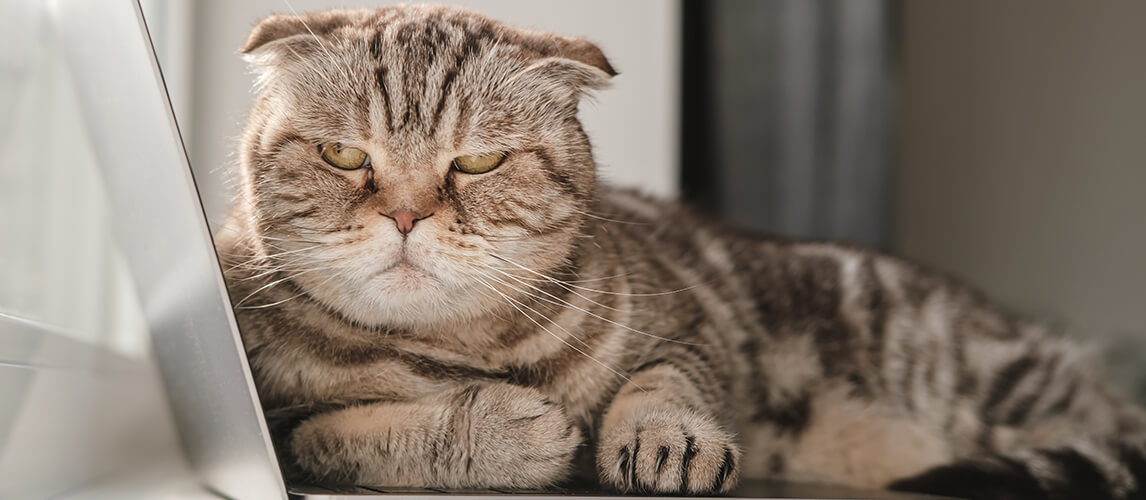Cat owners probably won’t be surprised to hear that it’s very possible for their cats to hold a grudge. Many cat owners are used to having their cat walk away from them in a huff or refuse to be held for a while. This can be accompanied by hissing, angry meowing noises, and flailing limbs as they try to get away from you. To learn more about the reasons that your cat might be mad at you, and what you can do to help your feline friends, our guide below has everything you need to know.
Do Cats Hold Grudges?
Cats fight every day. They’re used to holding grudges and forgetting what they were mad about. Most cats will avoid fighting, but some can be very territorial. As a cat owner, it’s your job to socialize your cats so that they are kinder to each other. Cats who are more familiar with each other, and were properly socialized, are less likely to get into aggressive fights.
Cats communicate through their body language; which is why it’s so important for you to watch your cat’s tail and their posture to determine how they’re feeling. When cats exhibit strange behaviors, there will have been something that caused those behaviors in your cat’s long-term memory.
Your pet’s behavior is one of the quickest ways to figure out whether or not they’re mad at you. Cats can hold grudges – both towards each other and against their pet owners.
How Long Does a Cat Hold a Grudge?

A cat’s memory can last up to 16 hours, according to the research completed by those at the University of Michigan. That doesn’t mean that a cat forgets their owners after 16 hours, just that less meaningful memories will disappear.
The interesting thing is that older cats are more likely to get mad at you. Younger cats aren’t as easily annoyed because they’re still learning and getting used to their surroundings.
It’s also possible for you to mistake your cat’s body language for annoyance when they might actually be showing signs of an anxiety disorder. If your cat doesn’t like being picked up and often runs from sudden noises, they may be over-anxious, rather than irritated.
As long as your cat is actually holding a grudge, you can expect them to be over it by the next day at the latest. Cats get over things very quickly, but they might show some unwanted behaviors while they’re cooling down.
How Long Does a Cat Stay Mad at you?
Your cat holding a grudge and being mad at you can be seen as two separate things. If your cat is holding a grudge, they aren’t likely to forgive you anytime soon, and they will remember the behavior you exhibited that made them frustrated, sad, or angry.
When a cat is just a little mad at you, though, they may forgive you quicker. Minor situations, such as moving their litter box or not filling their food bowl fast enough, are quickly resolved. In fact, it’s likely that your cats will try and get your attention to make you fix your mistake before they actually get mad at you. Whether you have one pet or are in a multi-cat household, any of your cats will have learned how to get your attention. Many cats do this by acting troublesome to make their owner get up and figure out what’s going on.
Reasons your cat night be mad at you
- A visit to the veterinarian.
- Being put into a cat carrier.
- Car rides.
- Going too long between meals.
- Empty water bowl.
- Dirty litter box.
- Not enough attention.
Do Cats Forgive?
As quickly as they get mad at you, a cat can forgive you. Senior cats sometimes take longer because they have other issues to deal with and get annoyed when their owner does something they don’t like. From your cat’s point of view, you should know what they need by now. Cats remember your actions and may be hissy for a few hours before letting you off the hook.
Younger cats forgive and forget very quickly. They have short memories as kittens and a lot of their energy is put into figuring out new skills. Remember to form good memories with your case and other animals from a young age. The more positive their upbringing is, the less likely they’ll be to act out in negative ways.
How to Apologize to a Cat
Apologizing to cats may seem like a difficult task for humans to accomplish, but it’s not as hard as it sounds. It may seem silly, but actually telling your cat “I’m sorry” is really important. Your kitties have picked up on your own behaviors and though they don’t speak your language, they can understand you through the tone of your voice and your body language.
After apologizing verbally, employ the use of the “slow blink”. This is one of the many ways that cats communicate, and it’s known as a way for cats to show that they’re comfortable with the person or animal they’re blinking at. Some believe it’s a feline’s way of saying “I love you.”
From there, spend time with your cat. Pet them until they start purring, play with them, and feed them a couple of treats. These positive actions are all excellent ways of apologizing to kittens and older cats.
The Best Ways to be Forgiven by Your Cat

- Space and time by themselves until they come back to you.
- Pets in their favorite places (try their head, ears, and back).
- A few treats (don’t feed them too many because of the added calories).
- One-on-one time, such as playing with cat teasers or just sitting with them for a bit.
- If your cat has a favorite movie or song, try playing it out loud.
Remember that cats are social creatures. After a while, they’ll come and sit with you and may even join in on a quick cat nap if they realize you’re settling down to sleep for a bit. Try lying down in bed and watching a movie, your cat will soon join you.
FAQs:
Q: Is my cat mad at me?
A: Check for a slow, swishing tail that is quickly moving side-to-side, and ears that are pinned back against their head. Both of these signs are immediate ways to tell that your cat is mad at you. If your cat is showing low, defensive body language, you should step back and leave them alone for a time. Depending on how angry they are, they may very well try to stretch or bite you if you touch them.
Q: Is my cat angry or anxious?
A: The signs of anger and anxiety are very similar in cats. Cats get defensive when they’re scared, which makes it difficult to tell whether your pets are mad or upset about something. The major difference is that cats with anxiety disorders are more likely to run and hide away or crouch low in a corner before dashing through open doors. If you believe that your cat has anxiety, get in touch with a vet for assistance and treatment plans.

